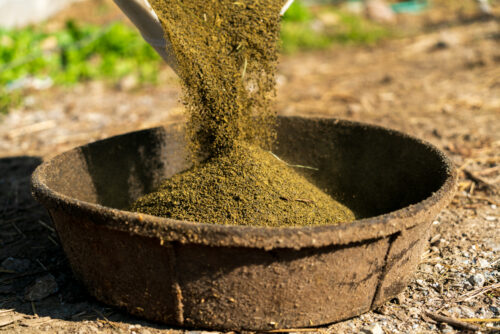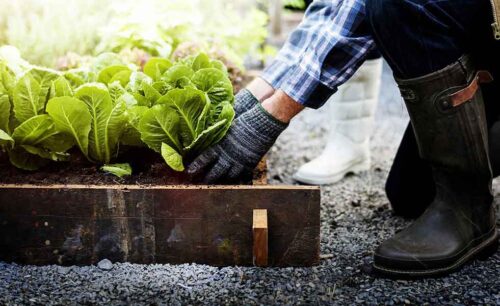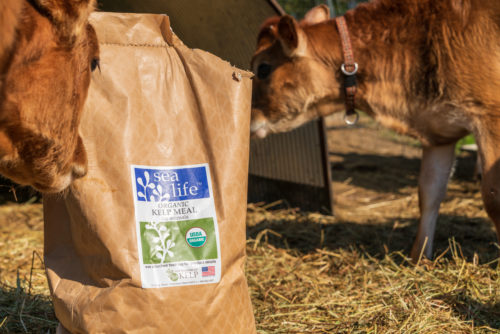Seaweeds, especially brown seaweeds, contain a variety of vitamins and minerals, such as iodine, amino acids, thiamin, and vitamins A, C, and B12. Kelp meal in particular has recently grown in popularity in households and commercially because they have been proven to improve soil fertility.
In this article, we will take a closer look at the effects and benefits of kelp meal as an organic-use soil amendment and animal feed supplement, and how to use them effectively.

Kelp Meal As A Soil Conditioner
Kelp meal is an excellent addition to the garden that can be used on various crops. It provides plants with valuable micro and macro nutrients, minerals, and vitamins. It can also enhance soil structure, lessen drought stress, and improve plant tolerance to frost.
Benefits of Kelp Meal for Plants
Here are some additional advantages of using kelp meal as a soil conditioner:
- It helps with beneficial microbial growth which then fosters a healthier soil.
- It is ideal for chemical-free planting and farming because they are natural.
- It can enhance the efficiency of any soil or potting mix, allowing you to get the most out of a small amount of space.
How To Use Kelp Meal As A Soil Conditioner
The easiest application method is spreading it around the base of the plants, crops, shrubs, and flowers. It can also be used in plant potting medium or mixed directly into the soil.
Here are other kelp meal tips for your specific application:
- Early spring: apply at a rate of 1 lb. per 100 square feet and mix into the topsoil.
- Summer: Side-dress rows with 0.5 lb. per 100 square feet. Repeat in early, mid, and late summer.
- After harvest: Following harvest and bed cleanup, apply 1 lb. per 100 square feet and mix into the topsoil.
Kelp Meal As An Animal Feed Supplement
Kelp meal meets the trace element demands of animals typically lacking in mineral mixes, land-grown feeds, and pastures due to erosion and leaching. Moreover, research findings are indicating that farmers and breeders rely on them to ensure the health and productivity of their animals.
Benefits of Kelp Meal for Animals
There are substantial advantages to using kelp meal as an animal feed supplement for chickens, cattle, horses, sheep, goats, and other poultry creatures:
- It enhances animal feed utilization.
- It can reduce breeding problems for pigs and cows.
- It is helpful in boosting animal metabolism.
- It has been shown to boost overall gains, such as milk production in cows, egg production in chickens, and weight in pigs, cattle, and horses.
- It can minimize internal parasites in pigs.
How To Use Kelp Meal As Feed Supplement
Here are some suggested feeding rates for animals. These generally range within one to two percent of the feed ration:
- Horses: ½ oz. per day
- Dairy cows and cattle: 2-4 oz. per day
- Goats: 2% of the food ration
- Chickens: 1% of the total feed pre-mixed
- Sheep: 2% of the food ration
- Turkeys: 1-2% of the total feed pre-mixed
- Dogs: ¼ teaspoon per 25 lbs. body weight
- Cats: 1 pinch (approx. 1/16 teaspoon) per day
Quality Kelp Meal From North American Kelp
For over 50 years, North American Kelp has been your trusted provider of responsibly and sustainably sourced seaweed products. Our products are single-ingredient, renewable sources of minerals and vitamins for your animals and plants. We use a delicate drying process to preserve the seaweed’s nutrients, color, and a savory flavor, leading to an appetizing supplement that livestock and pets enjoy.
Our skilled and committed team is ready to help you meet your needs! Contact us today for more information or inquiries about our seaweed products.




2 Comments
Sharon Slocum
Need small jar of dark kelp too add to my cats food. Got a jar of really powdery grey kelp powder that does not smell good. Prefer the dark ocean smelling kelp. Still looking. What I have now will add to my trees and plants. Thank you for this post.
samantha
Thank you for reaching out Sharon. You can contact any of our retail locations to purchase our SeaLife™ Kelp Meal for Animals: https://noamkelp.com/store-locator/